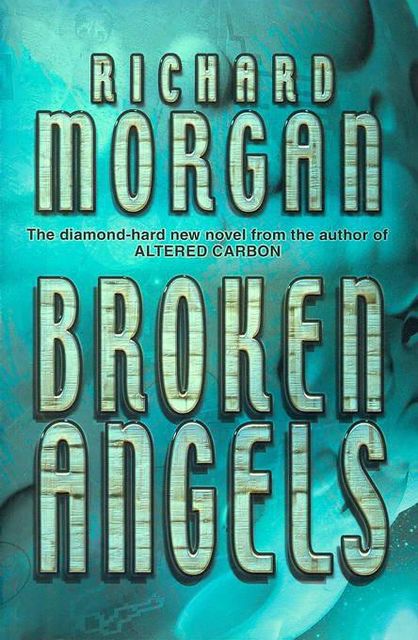Amazon.com ReviewCritics have compared Richard Morgan’s first novel, __, to the classic hardboiled fiction of Raymond Chandler. The comparison doesn’t accurately describe Morgan’s second novel, Broken Angels. Morgan’s prose never approaches Chandler’s metaphoric excess, and Morgan’s antihero, Takeshi Kovacs, doesn’t wisecrack nearly as often as Chandler’s hero, Philip Marlowe. Also, Kovacs’s far-future universe is considerably darker than Marlowe’s noir world. In Kovacs’s universe, high-tech implants called «stacks» record memory and personality; this means soldiers can be sent to their deaths, have their stacks implanted in new bodies, and be sent to their deaths again, and again, and again. Generals needn’t quibble about wasting lives in massacres or nuclear explosions. The slaughtered soldiers will soon be back in action—unless their stacks aren’t recovered. Then their consciousness will go mad, isolated in an indestructible, inescapable virtual reality. The proper term for the Takeshi Kovacs novels isn’t «hardboiled.» It’s «brutal.»
The Martians disappeared long ago, but they left behind their star gates, which have allowed humanity to spread across the galaxy—and bring warfare to the stars. As Broken Angels opens, Takeshi Kovacs is a lieutenant in humankind’s most feared mercenary company, but rumors of an astonishing archaelogical discovery inspire his desertion. Humans have never found a Martian starship until, perhaps, now. If the rumors are true, and the ruthless Kovacs can take possession of the unprecedented relic, he will make his fortune. But if he fails in his quest, he may find himself imprisoned in high-tech hell for eternity. —Cynthia Ward
From Publishers WeeklyDespite its slick formulaic structure, Morgan’s SF—hardboiled hybrid, the sequel to the well-received Altered Carbon, bursts with energy and intelligence. Protagonist Takeshi Kovacs is the product of a brutal future in which corporations and politicians fight for supremacy. Humanity has spread to the stars by deciphering charts left behind by the long-extinct Martians. Since people haven’t discovered how the Martians surpassed the speed of light, however, they usually travel through space by broadcasting their digitalized personalities from one planet to another and having them installed in new bodies, a technique that gives virtual immortality to the most unscrupulous individuals. One such is Kovacs, a young sociopath whom the interstellar government transformed into a super warrior before he went freelance. Kovacs resembles a smarter and deadlier Mike Hammer; part of the pleasure is watching him not only use his skills and conditioning but also struggle past his limitations to develop empathy for other humans. The few people Kovacs gets close to are the team that accompanies him on an expedition to claim the ultimate Martian relic—a functioning FTL starship. Morgan is good at presenting Kovacs’s mastery of high-tech weapons and other gadgets, as well as his reactions to disturbing alien artifacts. The mystery aspect of the story is also well handled, always hovering in the background of the violent action as Kovacs gathers clues. It all adds up to a superior, satisfying cyberpunk noir adventure. Copyright © Reed Business Information, a division of Reed Elsevier Inc. All rights reserved.


